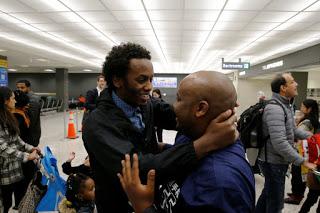Ephesians 2.11-22
 I love airports. Seriously, if I had not gone into the ordained ministry I would have tried to have ended up working at an airport. They are so romantic. And one of the things that make them so special is that they are places where people who are separated are reunited.
I love airports. Seriously, if I had not gone into the ordained ministry I would have tried to have ended up working at an airport. They are so romantic. And one of the things that make them so special is that they are places where people who are separated are reunited. You get in the plane and even though you are far from your home or from those you love, you are brought close to them.
Our reading today is about how, ‘in Christ’, we are brought close. We are brought close to one another and we are brought close to God.
Last week I tried to explain the idea of being ‘in Christ’ by comparing it to a book. Christ is the book and we are placed, like separate pieces of paper, in the book. Where Christ is, we are.And to take the illustration a little further: It is the Holy Spirit who binds us together into the book. And we only mean something when we are in the book. On our own, as a torn out page, we are useless. And if we are torn out of the book, well then the book is missing something pretty important. Don’t you hate it when you are reading a book and discover that there are some pages that are missing.
Or we thought of Christ like this building. We come from many different countries, but we are all gathered together in this building.
In Christ – we have been brought together
1. In Christ we who were far from each other have been brought near to each other.
We’ve been made one people, one new humanity
There was a great division between Jew and Gentile. Jews despised Gentiles and Gentiles ridiculed Jews.
And Paul, writing to the Gentiles says, ‘But now you who once were far off have been brought near by the blood of Christ’ (v13)
It was a significant division because the Jews were God’s chosen people.
God had said that he would be their God. He gave them his promises: of a home, of a kingdom of joy and peace and abundance – where there would be no more sickness or death. He gave them a purpose: they were to bring his blessings to other peoples, even if it meant that they would have to suffer. And he gave them the promise of his presence. He warns them that it will not be easy. They will have to walk through fire and go through the waters. But he will be with them, he will guide them, he will comfort them and he will restore them.
And now, in Christ, we have been united with God’s people.
Their history becomes our history. Jonathan Sacks writes that as Jews recall the story of how God rescued his people from Israel 4000 years ago, they say, ‘When we were slaves in Egypt .. when we came through the Red Sea’. And as people who are now in Christ, the Old Testament becomes our story.
And the promises that God gave to them become promises that are given to us. Their future becomes our future.
These verses in Ephesians 2 specifically apply to the division that exists between Jew and Gentile. But they also can apply to all those other divisions which separate people from people.Divisions of nationality, customs, diet, language, skin colour, class or education. I’m sure you can think of many more.
In Christ, those divisions have been broken down.
One of the most powerful communion services I have ever attended was in Bangalore. We were in a church. I was told, as I looked around, that here were people from every caste: Brahmins and Dalits (untouchables). And we all drank from the same cup.
In Christ we have a new permanent global, cosmic identity. My first allegiance is now not to my nation or my tribe or even my family – important though those are. My first allegiance is to Christ.
That is why authoritarian states are always going to be suspicious of Christians – they cannot rely on their total loyalty
All our customs, all our achievements, all the things in which we put our pride or security are shown to be worth nothing. We come as sinners, who have nothing to offer. Our position in Christ is not due to my keeping the law or observing the commandments – but on his death for me and you, on his forgiveness, on his overwhelming grace and love. And we have been brought together in Christ.
I am a sinner who has been saved by grace and brought into Christ.You are a sinner who has been saved by grace and brought into Christ.
And so Christ, in his death for you and me, has broken down the wall that stood between you and me.
This is a piece of the Berlin wall. That was a literal wall that separated people, and in 1989 it was smashed down.
Well 2000 years ago, when Jesus died on the cross, the wall that separated you from me was smashed down. And we who were far off from each other have been brought together. We are no longer strangers and aliens, but fellow citizens with the saints. We are members of the household of God.
In a few minutes time we will speak of the fact that Christ is our peace. In him, we have been brought together as one body. And we share the peace.
My prayer is that the peace which we share on Sunday will become the peace that we live, one with another, from Monday to Saturday.
2. in Christ we who were far from God now have access to God.
We were not only far off from each other.We were, especially those of us brought up as Gentiles, were far off from God.
At least the Jews knew about God. They knew about his holiness. They knew about his law. They knew about how God was like fire – you do not mess with him. Do you notice how often we miss out those passages in the Old Testament that speak of the wrath of God, or that show God acting in awesome and at times to us dreadful ways that we do not understand. But the writers of the Old Testament could not cut out those passages. They knew who they were dealing with, and they knew that God was far bigger than their understanding. And those Jews who understood, realised that they could only come into his presence through the sacrifice of another being. They knew about the presence of God, the love of God, but they also glimpsed a bit of the awesomeness, the otherness of God.
But we! Well we have either fantasised God or rejected God. We have fantasised him: we’ve made him into the god that we would like him to be. We’ve reduced him to the status of a tame pet, or a personal genii. We’ve certainly cut out of the Old Testament those bits that we don’t like. And when that happens, the atheists are right. The god of our fantasy does not exist. He is a figment of our imagination. He is a comfort blanket. And we do not have access to God, because we are blind to God.
And Paul says to both Jew and Gentile – to the Jew who was aware of the distance between God and themselves, and to the Gentile who fantasised about god and make him to be whoever he wanted him to be - Paul says to them that in Christ we both have access to the Father.
Those are amazing words. To the person who is terrified of God, terrified of the God who is beyond understanding, terrified that they have messed up, that God hates them or against them – these are amazing wordsAnd to the person who has ignored God, or fabricated their own little god – they are amazing words. You can get to know the real God – not just as God, but as our heavenly Father.
We don’t need any sacrifice – because there is one who has sacrificed himself for us.We don’t need priests in the Old Testament sense. We don’t need someone to stand in our place before God, on our behalf - Bbcause someone has already done that for us. Jesus. And we don’t need mediators. We don’t need to pray to the saints or even to Mary in order to get God to hear us. We can go direct to the top. We are in Jesus, we can go to Jesus. And together with Mary and with the saints, we pray in Jesus name.
Because we are in Christ, and he is the beloved one, who has always been and always will be in the presence of his Father, then if we are in him, then we are in the presence of the Father.
That is why we can pray Jesus’ prayer: ‘Our Father in heaven’. That rather sums it up for me – our Father (intimacy) in heaven (the otherness of God).
That is why we can know intimacy with God. Kallistos Ware speaks of how, as a child, he was struck by the story of the man who would go into church to sit or kneel to pray for hours. Someone said to him, ‘You must have a lot of sins to confess or a lot of things that you need to ask God for’. ‘Oh no’, said the man. ‘Well what do you do?’ He answered, ‘I sit and look at Him, and He looks at me’.
Most of the time the Christian life is about walking by faith and being obedient to God, when we can’t see him or feel him. But there are moments of intimacy and, even if you haven’t yet had them, if you are prepared to stop and become vulnerable before God, and give God the time, then they will come.
We have access to Father God. That is why, in Christ, in Jesus’ name, praying what Jesus would pray, we can bring our petitions and bequests before him; and we can be confident that even if he doesn’t answer our prayers as we would like - he still hears, and he will give us what is good and perfect for us.
At Sheremetova airport, just where you have your bags checked after coming in on the aeroexpress, there is an Orthodox chapel. In view of what this passage is saying, that is quite appropriate. Airports are places where people from all nations are brought together. And the Church is just basically a very big airport. It is the place, in Christ, where we have been brought together. Brought together with each other, and brought together with our God.
v17: ‘so he came and proclaimed peace to you who were far off and to peace to those who were near; for through him both of us (Jew and Gentile) have access in one Spirit to the Father’.

